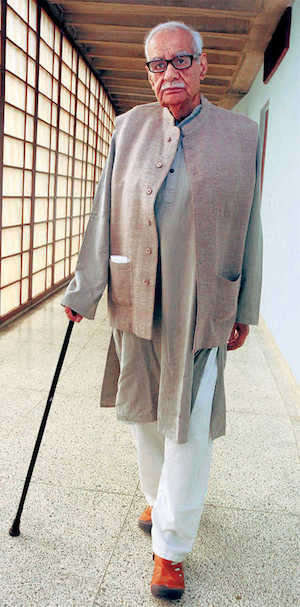NEW DELHI(TIP): Eminent journalist and author Kuldip Nayar, who fiercely fought for press freedom and protecting civil liberties, passed away on Thursday, August 23 morning. He was 95.
Nayar died at around 12.30 am at the Escorts hospital in Delhi, his elder son Sudhir Nayar said.
He was suffering from pneumonia and was admitted to the hospital five days back, Sudhir said.
The journalist is survived by his wife and two sons
“He kept working till the last and dictated his column before being admitted to the hospital,” his granddaughter Mandira Nayar said.
Recalling his enthusiasm, she said he retained the eagerness of a cub reporter and wanted to know details of every development, she said.
Nayar, known as a crusader for civil rights and press freedom, worked in several newspapers, including as the editor in ‘The Statesman’.
He had also served as the Indian High Commissioner to the United Kingdom in the 1990s and was nominated to the Rajya Sabha in 1997.
Photo / courtesy Indian Express
He was arrested during the Emergency.
Nayar was also known for his efforts to improve frosty relationship between India and Pakistan, including leading peace activists to light candles on the Independence days of Pakistan and India at the Attari-Wagah border near Amritsar.
Prime Minister Narendra Modi condoled the demise of Nayar, saying his strong stand against the Emergency, public service and commitment to the country would always be remembered.
“Kuldip Nayar was an intellectual giant of our times. Frank and fearless in his views, his work spanned across many decades. His strong stand against the Emergency, public service and commitment to a better India will always be remembered. Saddened by his demise. My condolences,” Modi said in a tweet.
Editor of the Week magazine, Sachidanand Murthy, remembered Nayar’s contribution in fiercely protecting press freedom and civil liberties.
“He had protested against the infamous Defamation Bill which was brought by the Rajiv Gandhi government in late 1980s. He had also worked tirelessly to ensure protection of civil liberties in India,” said Murthy.
The Defamation Bill was seen as an attempt to contain free speech in India. Following public outcry, the then government had withdrawn it.
Nayar had written a number of bestsellers, including ‘Beyond the Lines: An Autobiography’ and ‘Between the Lines’, a book on politics. Nayar was also one of the most respected syndicated columnists and his columns and op-eds were published in over 50 newspapers.
He was born in Pakistan’s Sialkot in 1923 and began his career in journalism in Urdu press.
(With inputs from PTI)
